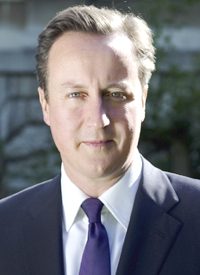
Great Britain’s Prime Minister has declared of his country what President Obama has notably denied of his own. Speaking to an audience of Church of England clergy at Christ Church, Oxford during one of the many official events celebrating the 400th anniversary of the King James Version of Scripture, Prime Minister David Cameron (left) unashamedly declared of Britain: “ … we are a Christian country,” adding that “we should not be afraid to say so.”
While he quickly emphasized that he was “not in any way saying that to have another faith — or no faith — is somehow wrong,” Cameron nonetheless acknowledged that “the Bible has helped to give Britain a set of values and morals which make Britain what it is today.”
He challenged his audience that biblical morals and values were something “we should actively stand up and defend,” warning that the “alternative of moral neutrality should not be an option. You can’t fight something with nothing — because if we don’t stand for something, we can’t stand against anything.”
While his remarks — peppered with a host of qualifications along with an admission that he was a “vaguely practicing” Christian — made many serious believers wonder how sincere the Prime Minister might be in his embrace of the Christian faith — Cameron’s comments nonetheless reflected how intertwined his country’s politics and culture were with the rich symbolism and language — as well as the eternal values — found in the Authorized version of the Bible.
Cameron observed that “the King James Bible has bequeathed a body of language that permeates every aspect of our culture and heritage, from everyday phrases to our greatest works of literature, music, and art.”
He added that “just as our language and culture is steeped in the Bible, so too is our politics. From human rights and equality to our constitutional monarchy and parliamentary democracy, from the role of the church in the first forms of welfare provision, to the many modern day faith-led social action projects, the Bible has been a spur to action for people of faith throughout history, and it remains so today.”
Recalling Margaret Thatcher’s observation that Great Britain is “a nation whose ideals are founded on the Bible,” Cameron declared that Scripture “has helped to shape the values which define our country.” He catalogued a few of those values — “responsibility, hard work, charity, compassion, humility, self-sacrifice, love, pride in working for the common good, and honoring the social obligations we have to one another, to our families and our communities” — declaring that “these are the values we treasure … yes, they are Christian values, and we should not be afraid to acknowledge that.”
Cameron rightly observed that faith “is neither a necessary nor sufficient condition for morality,” pointing out that “there are Christians who don’t live by a moral code, and there are atheists and agnostics who do.” Nonetheless, he emphasized that a discounting of the moral tenets taught in Scripture has opened the door to the lawlessness, extremism, selfishness, and greed with which once ordered societies such as Britain find themselves grappling.
Challenging the moral neutrality that has infected British — as well as American — society over the past few decades, Cameron declared that “for too long we have been unwilling to distinguish right from wrong. ‘Live and let live’ has too often become ‘do what you please.’ Bad choices have too often been defended as just different lifestyles.” But, he added, “To be confident in saying something is wrong is not a sign of weakness; it’s a strength.”
Cameron challenged that it is time for Britain to return to the Christian values which made it a strong nation in the first place, to “have the confidence to say to people — this is what defines us as a society, and that to belong here is to believe in these things.”
He concluded his address to the Anglican clergy with the reflection that “Christianity, faith, religion, the Church, and the Bible are all inherently involved in politics because so many political questions are moral questions. The values we draw from the Bible go to the heart of what it means to belong in this country and you, as the Church of England, can help ensure that it stays that way.”
While the nuances of Cameron’s speech make it clear that his view of faith is pluralistic to the point of discounting some of Christianity’s most distinctive elements, the Prime Minister nonetheless made a passable show of defending Christianity as the faith tradition which continues to light the way for Great Britain.
How different that is from the efforts made by President Obama over the past few years to subtly denigrate the influence that the Christian faith has had on America. As noted by Dr. John Eidsmoe in The New American, at a press conference in the Muslim nation of Turkey in April 2009, Obama pointedly declared that Americans “do not consider ourselves a Christian nation, or a Jewish nation, or a Muslim nation. We consider ourselves a nation of citizens who are bound by ideals and a set of values.”
In June 2007, then-Senator Obama offered a similar discounting of America’s Christian heritage, declaring in a speech that “whatever we once were, we are no longer a Christian nation — at least, not just. We are also a Jewish nation, a Muslim nation, a Buddhist nation, and a Hindu nation, and a nation of nonbelievers.”
But throughout the centuries an abundance of esteemed and noteworthy Americans have agreed that while America is composed of people of many faiths, along with those who have no faith whatsoever, it can rightly be considered a Christian nation because, far more than any other faith or philosophy, Christianity has defined and inspired every inch of its moral, cultural, and political fiber.



